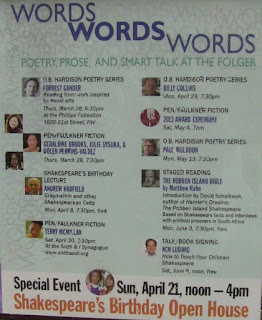'Matthew Hahn’s The Robben Island Shakespeare is indeed a manual for both the young and old in South Africa and the world, to help us charter the difficult journey of life and the survival of the human spirit, UBUNTU, against all odds.' - Tony Award Winning Actor and South African Cultural Activist John Kani, in his introduction to The Robben Island Shakespeare.
Thursday, 6 June 2013
The Robben Island Bible at the Folger Library 3 June 2013
On the 3rd of June, The Robben Island Bible was performed as a reading at the Folger Shakespeare Library in Washington, DC. It was a sold out performance with over 200 people in attendance. The reading was followed by a short Q & A with Fran Buntman, David Schalkwyk & Matthew Hahn. The evening was supported by the United Negro College Fund.
It was exciting to be a part of this performance as it was the first time the play has been read in the United States. It accompanies an exhibition at the Library of Sonny's book along with a brief display about Robben Island.
Not for the first time, but certainly the most overt time was my realization of the similarities between the Black South African struggle for liberation and the African- American struggle in the States. I was surrounded in Washington, DC by the Lincoln Memorial, the Martin Luther King Memorial, the lunch counter from Woolworths in the Smithsonian & the exhibition there about the similarities between the Emancipation Proclamation in 1863 & the March on Washington in 1962, the new African American museum that is under construction to the and a variety of other pertinent memorials, so how could I not make the connection? Although I have always been focused on a South African response to the play & research, I think that there is a lot of potential to examine Leadership & Social Responsibility in the United States using the play & interviews because there are so many parallels of both stuggles [and their not so complete outcomes]. From MLK & Nelson Mandela, the iconic leaders of the Struggle to the Black Panther & Black Consciousness Movement, to the many notable men & women who gave their lives to the struggles for equality. So much of what I heard in my interviews, I am sure could have just of easily been heard from an African American.



